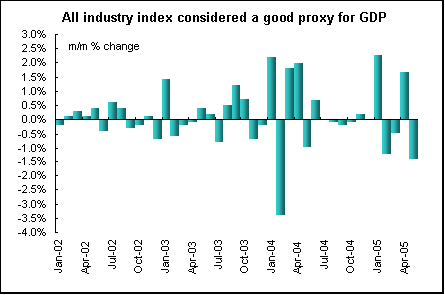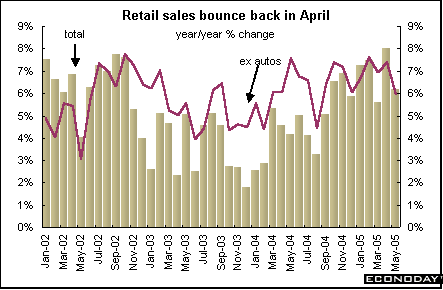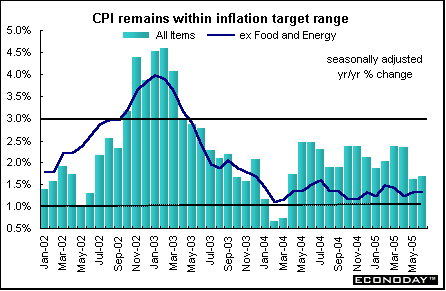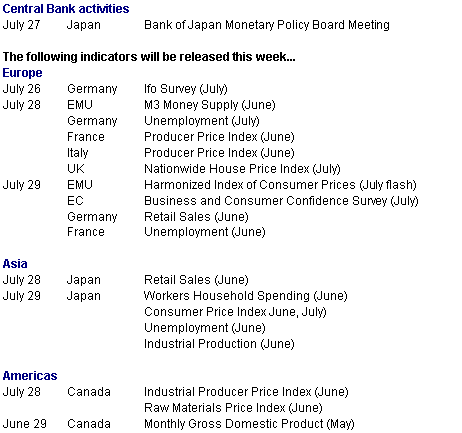Monday, July 25, 2005

Despite months of badgering, China's central bank still surprised the financial markets Thursday when it took its first mini step away from its 10 year U.S. currency peg and authorized a managed floating exchange rate. It said the value of the currency would be expressed in terms of a currency basket. As to be expected, the biggest reaction was in the foreign exchange markets and especially in the yen. The yen, which had been slowly weakening against the dollar shot up by over 2 yen. It is important to emphasize that no specific information about the composition of the new basket of currencies is available - and if they follow Singapore's example, it won't be available. Malaysia followed the Chinese move, abandoning its seven year fixed currency peg for the ringgit against the dollar, but Hong Kong did not. Hong Kong has maintained a successful dollar peg for more than 21 years.
Both China and Malaysia's managed float exchange rate systems appear broadly similar to that used so successfully by Singapore, although details remain sketchy. Singapore has used what is known as the "basket, band and crawl" or BBC system for over 25 years. The Singapore dollar is managed against a undisclosed basket of currencies of its main trading partners and competitors. The exchange rate floats within a set policy band which allows the currency to crawl up or down instead of being subject to sharp fluctuations.
The Monetary Authority of Singapore has said the BBC policy has given it flexibility in responding to changes in both local and global conditions to maintain export competitiveness and control inflation. The composition of the currency basket is revised periodically to take into account changes in trade patterns. The secret policy band is regularly reviewed to ensure it remains consistent with economic changes, with adjustments as frequently as every six months. Singapore operated with a dollar peg but then subsequently shifted to the float in the 1970s. It chose the BBC regime because of a close link between exchange rates and interest rates in a small and open economy. The float guides monetary policy rather than interest rates. But the currency trading bands in China and Malaysia are narrower than in Singapore, which means smaller currency movements. China's trading band is also adjusted on a daily basis.
The International Monetary Fund has listed about 40 countries that use some type of managed float system. But Singapore officials say their system is in some ways unique since it is used also to control monetary policy, while policy statements provide a clear indication to the markets of where the currency is headed.
On Thursday, the yen jumped in value after China ended its peg to the U.S. currency, spurring expectations Japan's exports would become more competitive. The yen also gained against 15 of the 16 most actively traded currencies, including the Swiss franc and Canadian dollar. But the yen gave back about half of its gains in Friday trading on speculation that Japan won't hesitate to intervene to stem gains made after the Chinese move. The Bank of Japan, acting at the behest of the Ministry of Finance, sold ¥14.8 trillion ($134 billion) in the first three months of 2004, after record sales of ¥20.4 trillion in 2003. Japan hasn't sold since March 16, 2004 according to ministry data. The dollar weakened immediately against the yen from ¥112 to ¥110, but remained well above the ¥105 level that the finance ministry set as an unofficial limit when it intervened last year. Before Beijing's announcement the yen had been falling sharply amid talk in Tokyo of an early general election.

Global Markets
Investors were spending a typical mid-July week evaluating the plethora of earnings reports when they were interrupted by two market moving events - the limited float of the Chinese currency followed by more terrorist bombs in London. Stocks such as Merck were punished by investors for disappointing earnings while others including Ebay and Google were rewarded on their reports.
The Chinese revaluation had an instant galvanizing effect on financial markets, at least until the new London attacks. The revaluation boosted stocks because it was seen as lessening the competitive pressures on U.S. and European businesses. By shifting to a currency basket, the Chinese might have less need to accumulate dollar assets. Both the yen and the euro were up on the news. But a 2 percent revaluation is unlikely to make any dent in the competitive advantage of the Chinese manufactured goods sector or have any impact on the U.S. trade deficit. Of course, the Chinese move may lead to a more general Asian revaluation which would magnify the impact (Malaysia has already said it will switch to a currency basket).
On the week, only the Nikkei and Topix were down. The remaining indexes - including the FTSE - were up on the week. The Dow is the only index of those followed here that remains below its end of 2004 level. The Nasdaq has finally inched above that level.
Global Stock Market Recap

Europe and Britain
The attempted bombings in London and news of the revaluation of the Chinese renminbi ensured a volatile day of trading on Thursday. The FTSE had gained 40.6 points during the morning as mixed updates from the retail sector were shrugged aside with many traders preferring to watch the excitement of the first day of the Ashes cricket. However, this was interrupted by new security alerts midday, which initially sent the FTSE 75.8 points lower. But stability was soon regained. The reaction among stocks in the transport, retail and leisure sectors, which were down after the first terrorist attack two weeks ago, was almost minimal. This was followed shortly afterwards by news that the Chinese renminbi was to be revalued, a move that could have important implications for the London equity market.
The FTSE has shown remarkable resiliency over the last couple of weeks as it recovered from each attack. On Thursday, the financial markets underwent a wave of selling on the news of the attacks, but rallied as it became clear that the latest incidents were on a smaller scale and had caused little injury. Analysts said that the attacks on London's transport system are unlikely to have a significant impact on the economy, with the possible exception of the tourism sector.

For the first time in its 98 year history, Royal Dutch Shell began trading as a single, unified company in London. The new shares will also trade on Euronext Amsterdam and as American Depositary Receipts in New York. Shell shares have risen more than 20 percent in London since the plan to combine the U.K. and Dutch companies was announced last October, as fund managers rebalanced portfolios to reflect the new company's weighting in the FTSE 100 index.
Asia/Pacific
Reaction in Asia to the Chinese revaluation move came on Friday as Japanese stocks slid in response to China's revaluation of the renminbi. The revaluation, which had sent the yen up sharply against the dollar during U.S. trading, depressed exporters' stocks, especially those of auto manufacturers. Other export-intensive sectors such as information and communication that had not been performing consistently well also declined. On the week, only Japanese stocks were down.
Stocks in Singapore soared after the government loosened restrictions on lending. The Straits Times (STI) jumped 2 percent, to a 5�-year high. Real estate stocks led the way after the limit on loans for property purchases was raised to 90 percent from 80 percent of price. The government also changed the rules on the use of pension funds for property buying and eased restrictions on foreign ownership of real estate.

China dominated the headlines at the end of the week with its long-awaited but modest revaluation of the yuan. But there was plenty of other news earlier in the week to keep China-watchers occupied. While most countries tend to stagger their economic releases through the month, China tends to release them in bulk. On Tuesday they released GDP, inflation, industrial production and retail sales. The data showed the economy powering forward and doing so without inflation. China continued its impressive run of strong GDP growth in the second quarter, jumping 9.5 percent on the year - GDP was up 9.4 percent in the first quarter. Inflation was up by just 1.6 percent on the year after climbing by 1.8 percent in each of the previous months. Economists expect that in spite of the ferocious pace of growth, monetary policy is likely to be kept on hold in the second half of the year. On Tuesday the People's Bank of China said in a post-meeting statement that it would continue to "implement a stable and healthy monetary policy and maintain the steady growth of credit." June industrial production climbed by 16.8 percent from a year earlier, a slight acceleration on the previous month.
Indicator scoreboard
EMU - June harmonized index of consumer prices edged up 0.1 percent and was up 2.1 percent when compared with last year. Price increases in transport fuels and heating oil were offset somewhat by declining prices for vegetables and clothing. Heating oil prices jumped 8 percent while transport fuels were up 1.7 percent. Vegetable prices were down 3.3 percent while clothing prices were down 0.7 percent. Core HICP excluding energy and unprocessed food was flat on the month and up 1.4 percent on the year.

May industrial output was down 0.3 percent and inched up 0.1 percent when compared with last year. Output declined for every category with the exception of energy goods which were up 2.1 percent. Consumer durable goods dropped 1.6 percent while intermediate goods sank 0.4 percent and consumer nondurable goods were down 0.2 percent. May output declined in six countries, was up in five while one did not report May data.

May seasonally adjusted merchandise trade surplus was €3.2 billion, down from €4.2 billion in April. Seasonally adjusted exports were up 1.4 percent but imports jumped by 2.6 percent. Non-seasonally adjusted trade surplus was €2.2 billion, slightly above April's €2 billion surplus. Unadjusted exports were up 8 percent on the year while imports soared by 14 percent.

Germany - July Zew expectations index jumped to 37 from 19.5 in June. Center for European Economic Research (ZEW) said that one reason for the improvement, aside from the euro's recent depreciation, was the solid worldwide business-cycle development. The ZEW surveyed 315 German financial experts for their opinions on current economic conditions and the economic outlook for major industrial economies between July 4th and July 18th.

May manufacturing orders were revised up slightly to 2.8 percent rather than the originally reported 2.7 percent. Foreign orders were revised to a gain of 5.1 percent from the originally reported 5 percent while domestic orders were revised upward to 0.6 percent increase from the originally reported 0.5 percent gain.
France - June consumer spending for manufactured goods was up 0.5 percent and 0.5 percent when compared with last year. May spending was revised to a decline of 1.5 percent from the originally reported 0.9 percent drop. Clothing and textiles reversed May's 2.8 percent decline and was up 2.7 percent. Auto sales were up 1.3 percent while household durable sales declined.

Italy - May world merchandise trade deficit eased to €366 million from a deficit of €1.4 billion in April. The trade balance registered a surplus in May 2004 of €142 million. Exports were up 8.9 percent while imports were up 11.1 percent on the year. ISTAT said much of the deficit could be attributed to higher energy costs.

May retail sales were up 0.7 percent and 0.9 percent when compared with last year. Sales for both food and non-food were up on the year. ISTAT's retail sales data are not watched closely because they show little correlation with consumer spending in the GDP data.

Britain - June retail sales soared 1.3 percent and were up 1.6 percent when compared with last year. All sectors were up with non-food sales gaining 1.7 percent while non-specialized stores and others jumped by 2.1 percent. Food store sales were up 0.8 percent.

Second quarter gross domestic product was up 0.4 percent and 1.7 percent when compared with the same quarter a year ago. The 1.7 percent growth is the lowest rate since the first quarter of 1993 and almost half of the 3.2 percent growth rate achieved only in 2004. Manufacturing output declined 0.7 percent after a drop of 0.9 percent in the first quarter, confirming that the sector had dropped into a technical recession, which is defined as two consecutive quarters of falling output.

Asia
Japan - June seasonally adjusted merchandise trade surplus was ¥694.4 billion, down from ¥697.7 billion in May. Exports were up 2.4 percent while imports increased by 2.9 percent. On an unadjusted basis, the surplus was ¥873.1 billion. Exports were up 3.6 percent while imports jumped 11 percent on the year. The trade surplus with the U.S. was up 11.2 percent on the year while the surplus with Asia shrank 16.1 percent. Japan's trade deficit with China was ¥234.5 billion.

May tertiary industry index dropped 1.5 percent but was up 1.5 percent when compared with last year. The tertiary index reflects activity in 11 service industries, among which are utilities; transport; telecommunications; wholesale and retail; finance and insurance; real estate; restaurants and hotels; medical, health care and welfare.

May all industry index declined by 1.4 percent and was up 1.2 percent when compared with last year. The index was dragged down by weak service-sector activity and industrial production. The all industry index takes a reading of activity in the 11 industries that comprise the tertiary index combined with activity in the construction, agricultural and fisheries industries, the public sector and industrial output. This index is considered a close approximation for gross domestic product growth as measured by industrial and service sector output.

Americas
Canada - May retail sales fell 1.3 percent and were up 6.2 percent when compared with last year. Excluding autos, sales were down 0.4 percent but up 6 percent on the year. New car and truck sales were down after automakers scaled back discounts. The drop in total sales was the first this year and was spread over five of eight types of stores, including clothing and furniture.

June consumer price index was up 0.2 percent and 1.7 percent when compared with last year. Entertainment and clothing prices were down while the costs of gasoline and housing increased. Excluding food and energy the CPI was up 0.2 percent and 1.3 percent on the year. The Bank of Canada measure of core CPI which strips out eight volatile products was unchanged on the month and was up 1.5 percent on the year. The CPI remains well within the Bank's one to three percent inflation target range.

Bottom line
On Thursday, the Chinese government acknowledged what has long been apparent - that the renminbi is undervalued and that China's currency regime needed to be changed. Unfortunately, the reforms that were announced are disappointing. Analysts think that the initial move is far too small. They estimate that the renminbi's real trade-weighted value is undervalued by about 22 percent. But the move to a basket peg is considered a positive move. The small move will not correct the world's trade imbalances with China - especially the large U.S. current account deficit. Even if Japan and the rest of emerging Asia follows Malaysia and allow appreciations similar in size to China's initial revaluation of 2 percent, it is estimated that the trade-weighted value of the U.S. dollar would fall by less than 1 percent.
China's decision to make a small, gradual change in its exchange rate policy is consistent with the incremental reform strategy that it has followed over the past 25 years. Initial small moves to reform agriculture, foreign trade and state-owned enterprises were followed by further additional steps that eventually led to far-reaching structural changes that are producing impressive results. But incremental reform is the wrong strategy in the currency domain, where the initial disequilibrium is so large and where controlling expectations of future exchange rate changes is essential to promoting internal and external balance.
In broad terms, Asian currencies, eurozone and Japanese bonds and global equities are seen as the big winners from the revaluation, with U.S. bonds and the dollar perceived as likely to come under pressure. That is because the People's Bank of China and other Asian central banks have been large scale buyers of U.S. Treasuries as they sought to stop their currencies appreciating against the dollar, amid a sharp fall in the greenback against European currencies since 2001.
Looking Ahead: July 25 through July 29, 2005




